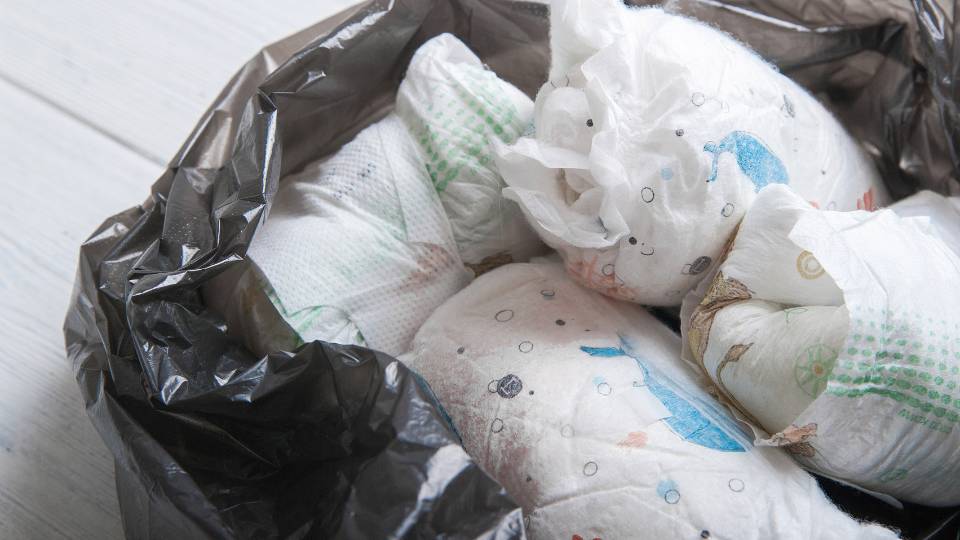
When it comes to hygiene products, proper sanitary waste management is not just a legal obligation but also a crucial aspect of maintaining a clean and healthy environment.
In this guide, we discuss everything you need to know about sanitary waste, from its definition to the intricacies of UK regulations and the best practices for disposal.
Table of Contents:
- What is Sanitary Waste?
- Why is Sanitary Waste Management Important?
- The Importance of Proper Sanitary Waste Management
- Sanitary Waste Laws and Regulations in the UK
- How to Manage Sanitary Waste
- Sanitary Waste Disposal
- Sanitary Waste Facts & Statistics
- Conclusion
What is Sanitary Waste?
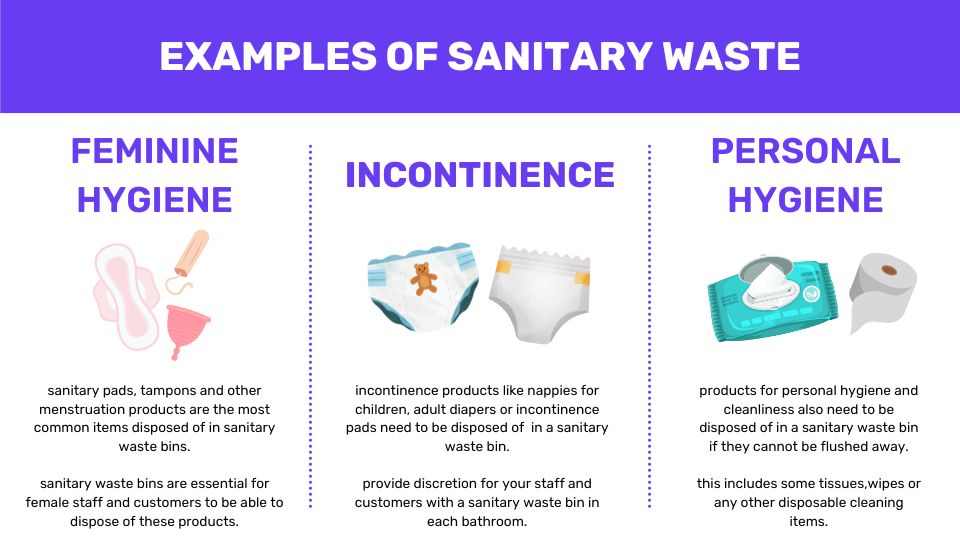
Sanitary waste is a broad category including various items that are discarded after use in sanitary conveniences dedicated to human hygiene.
These bins are usually in bathrooms, restrooms, changing rooms, and other facilities where personal hygiene practices occur.
Sanitary waste bins are different to clinical waste bins.
It’s really important for businesses to identify where their customers or staff may need access to sanitary waste bins in order to implement effective waste strategies.
Sanitary Towels & Tampons
Among the most common contributors to sanitary waste bins are sanitary towels and tampons.
These feminine hygiene products are disposed of regularly in restroom and bathroom facilities.
The materials used in these products, often containing a combination of plastic and absorbent materials, pose unique challenges in terms of disposal and environmental impact.
Diapers & Incontinence Products
For businesses with facilities catering to children or adults with specific needs, as well as the elderly, the disposal of diapers and incontinence products becomes a significant aspect of sanitary waste management.
The materials in these products, such as polymers and absorbent layers, necessitate proper disposal practices to mitigate environmental concerns.
Other Personal Hygiene Products
Sanitary waste includes more than just menstrual and incontinence products.
It also covers personal hygiene items like tissues, wipes, and other disposable products used for cleanliness.
Although these items may seem small, they add up to the total volume of sanitary waste produced in a business environment.
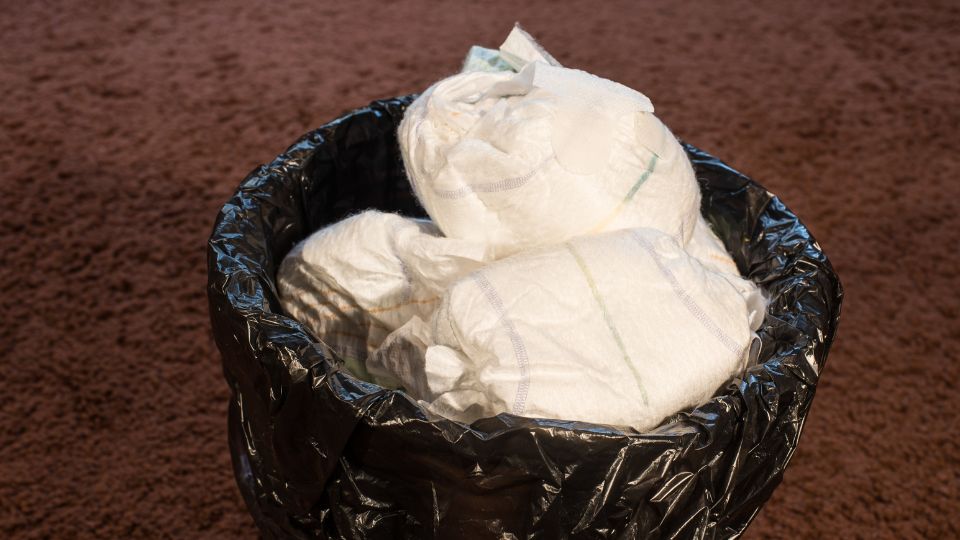
Why is Sanitary Waste Management Important?
Sanitary waste management is really important for health & hygiene, legal compliance, and the impact on the environment.
Not looking after your business’ sanitary waste management can have detrimental effects on your brand and the environment.
Sanitary waste often contains microplastics, which can be harmful to the environment. Unfortunately, due to the challenges in disposing of sanitary products properly, a significant amount ends up in landfills, contributing to pollution.
Traditional products, like pads and tampons, are often made with plastic components that don’t break down easily.
There’s a growing shift towards eco-friendly sanitary products as more consumers seek sustainable options. Products like menstrual cups, reusable pants with absorbent sponges, biodegradable pads, and bamboo-based items are becoming increasingly popular.
Bamboo, in particular, is a fantastic alternative—it’s biodegradable, highly absorbent, and has natural antibacterial properties, making it both eco-friendly and effective.
Health and Hygiene
A great understanding of proper sanitary waste disposal is really important for businesses and organisations.
Inadequate disposal practices can lead to the spread of infections and pose health risks to employees and visitors.
By understanding the diverse range of items classified as sanitary waste, businesses can tailor their waste management protocols accordingly.
Legal Compliance
In the UK, legal frameworks mandate businesses to manage sanitary waste responsibly.
Failure to comply with these regulations can result in penalties and reputational damage.
Understanding what constitutes sanitary waste is essential for businesses to ensure compliance with laws such as the Workplace (Health, Safety, and Welfare) Regulations 1992, thereby avoiding legal repercussions.
Environmental Impact
The environmental impact of sanitary waste cannot be overstated.
Many items within this category contain non-biodegradable materials, contributing to landfill pollution.
An awareness of the composition of sanitary waste allows businesses to explore eco-friendly disposal methods, minimising their ecological footprint and aligning with sustainable practices.
Acknowledging the diverse array of items falling under the umbrella of sanitary waste empowers businesses to adopt targeted and effective waste management practices.

The Importance of Proper Sanitary Waste Management
Proper waste management is not just about cleanliness, it’s about ensuring a safe and healthy working environment for employees and visitors alike.
Neglecting sanitary waste management can have negative consequences ranging from health hazards, to legal repercussions, to brand damage if not prioritised.
Ensuring Health & Safety
Effective sanitary waste management is essential for safeguarding the health and well-being of individuals within a workplace.
Improper disposal of sanitary waste can create breeding grounds for bacteria and pathogens, increasing the risk of infectious diseases.
Did you know that there is between 1-100 billion bacteria for every 1 gram of sanitary waste?
This is why it’s imperative to implement stringent waste management practices so that businesses can mitigate these risks and promote a hygienic environment conducive to employee well-being.
Mitigating Health Hazards
The accumulation of sanitary waste poses various health hazards, including foul odours, pest infestations, and contamination of surfaces.
These hazards not only compromise the physical health of individuals but also impact their mental well-being and productivity.
Prioritising proper waste management mitigates these risks, creating a clean and comfortable workspace for all.
Legal Compliance and Regulatory Obligations
Businesses have a legal obligation to manage sanitary waste in accordance with regulatory standards and guidelines.
Failure to comply with these regulations can result in legal consequences, including fines, sanctions, and reputational damage.
By adhering to established protocols and regulations, businesses demonstrate their commitment to maintaining a safe and compliant working environment.
It is a legal requirement that sanitary bins are accessible to those who need them.
It is also required that they are emptied and sanitised regularly to avoid strong odours.
All sanitary bins must be placed in a way that ensures the person using them can retain their privacy.
Environmental Considerations
Beyond the immediate health and regulatory concerns, proper sanitary waste management also includes environmental considerations.
Many components of sanitary waste, including plastic wrappers and absorbent materials, are non-biodegradable and contribute to environmental pollution.
Implementing sustainable waste management practices, such as recycling and incineration, minimises the ecological footprint associated with sanitary waste disposal.
In summary, proper sanitary waste management is integral to maintaining a safe, healthy, and legally compliant workplace environment.
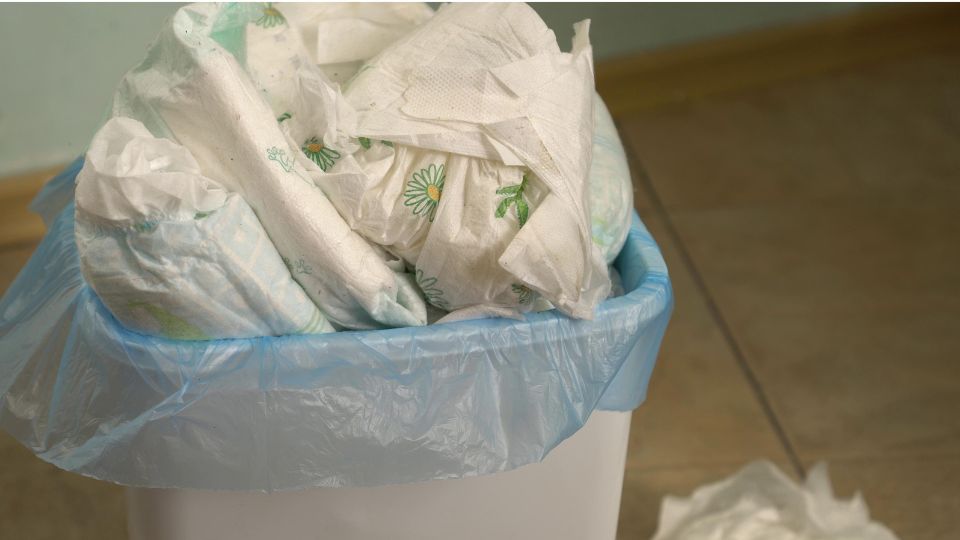
Sanitary Waste Laws and Regulations in the UK
Legal Framework
The UK has stringent regulations in place to govern the disposal of sanitary waste.
Businesses must adhere to the Workplace (Health, Safety, and Welfare) Regulations 1992, ensuring that appropriate sanitary bins are provided in female restrooms.
These bins must be regularly emptied and cleaned to avoid odours.
They must also be easily accessible inside cubicles to allow people privacy when using them.
All businesses with a bathroom must provide a sanitary waste bin, but care homes, hospitals, hotels, restaurants, and pubs may need to be more aware as they usually will be exposed to customers who will need sanitary waste bins, due to the type of customer they serve or the length of time the customer is at the establishment.
Duty of Care
Business owners have a ‘Duty of Care’ to ensure that all waste generated on their premises is handled responsibly.
Failure to comply with these regulations can result in penalties, making it imperative for businesses to stay informed about their responsibilities.
What is a Duty of Care Certificate?
A waste duty of care certificate is a document that confirms a person or organisation’s commitment to handling and disposing of waste responsibly and legally.
It demonstrates compliance with regulations and ensures proper management of waste from creation to disposal.
It’s a legal requirement to have one, ask your waste broker about yours.

How to Manage Sanitary Waste
You can read more about how to manage sanitary waste in the workplace in our dedicated blog!
Providing Adequate Facilities for Sanitary Waste Disposal
Investing in quality sanitary bins is a fundamental step in effective waste management.
Ensure that bins are easily accessible and discreet, encouraging proper disposal habits among employees.
Regular Collection and Disposal
Establish a routine for the regular collection and disposal of sanitary waste.
Partnering with licensed waste carriers ensures compliance with regulations and environmentally responsible disposal methods.
Sanitary Waste Disposal
Environmentally Friendly Sanitary Waste Disposal
Consider adopting environmentally friendly disposal methods, such as sanitary waste incineration or disposal through specialised waste treatment facilities.
This not only aligns with corporate social responsibility but also minimises the environmental impact of sanitary waste disposal.
Specialist Services
Engaging professional sanitary waste disposal services can streamline the process for businesses.
These services are well-versed in the regulations and offer comprehensive solutions, including proper documentation and certification.
Economic Implications
Businesses that invest in proper sanitary waste management not only fulfil legal obligations but also save money in the long run.
Penalties for non-compliance can be substantial, making prevention a more cost-effective approach.
Sanitary Waste Facts & Statistics
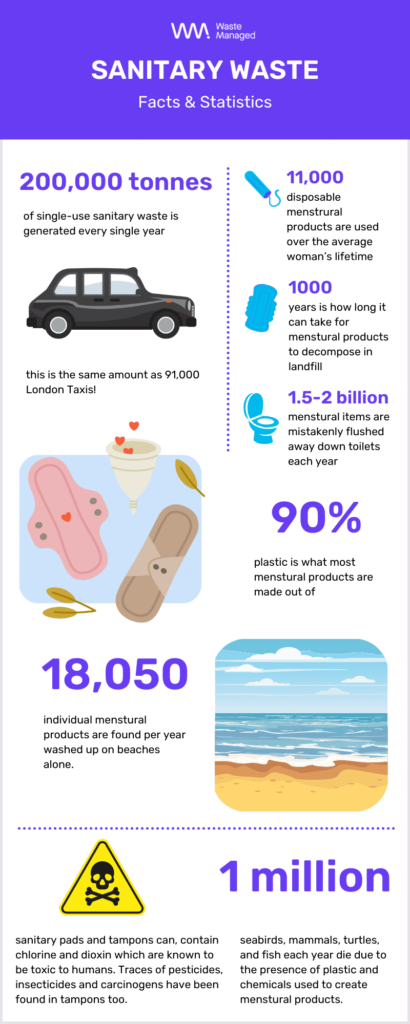
Did you know that improper disposal of sanitary waste contributes significantly to plastic pollution?
In the UK alone, over 4.3 billion disposable menstrual products are estimated to be used each year, highlighting the need for sustainable practices?
2 billion menstural products are flushed down the toilet each year, contaminating beaches and the natural landscape
A conventional sanitary pad is made of 90% plastic and contains around the same levels of plastic as four plastic carrier bags!
Conclusion
In conclusion, understanding and implementing effective sanitary waste management practices are essential for businesses in the UK.
By staying informed about regulations, investing in proper disposal methods, and promoting a culture of responsibility, business owners can create a clean and compliant workplace.
Share this guide to spread awareness and contribute to a healthier, more sustainable future!



